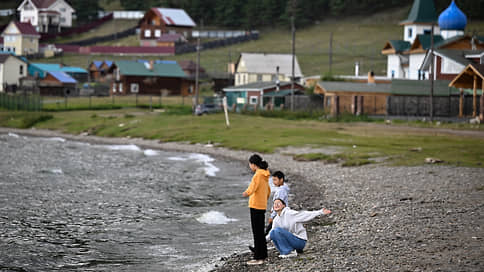“Russian funds” plunged into Baikal
[ad_1]

An acute shortage of quality hotels near Lake Baikal has made this tourist destination interesting for large investors in hotel infrastructure. As Kommersant learned, the Russian Funds investment group gained control of the Baikal View hotel on Olkhon Island worth about 1 billion rubles. Despite the increase in the flow of tourists to Baikal this year by one and a half times, projects there for investors, tourism industry participants warn, may turn out to be difficult due to pronounced seasonality and unresolved environmental problems.
Co-founder of the Russian Funds group Konstantin Beirit and members of the board of directors of Seligdar PJSC controlled by it Sergey Tatarinov and Gennady Launer became co-owners of Pribaikalsky Agropark LLC, Agropark-Olkhon and Agropark-Khuzhir, follows from the data Kartoteka.ru.
The first two structures are developing the Baikal View hotel with 99 three-star rooms on the Baikal island of Olkhon, according to the website of the administration of the Olkhon district of the Irkutsk region. Agropark-Khuzhir is registered at the same address and has a similar type of activity. Russian Funds and Baikal View did not respond to Kommersant’s request. According to the founder of Ivashkevich Hospitality, Stanislav Ivashkevich, the current cost of the hotel could be about 1 billion rubles.
According to SPARK, the balance holder of the Baikal View building itself is Agropark-Olkhon. Initially, this legal entity was owned by Vladimir Efremov, since 2015 Marina Ulakhanova became the main owner. After the appearance of representatives of “Russian Funds” among the founders, she retained 13.62% of the project. Ms. Ulakhanova did not answer Kommersant’s questions.
The Russian Funds investment group has existed since 1997 and is managed by the first head of the board of directors of Rambler, Sergei Vasiliev, and his partners. Her portfolio includes, in particular, PJSC Rusolovo, the gold mining holding Seligdar, the Melkom Group, the Last Minute Store chain, the Azimut Hotel Volga in Astrakhan and a stake in Azimut Olympic in Moscow.
Tourist trips to Lake Baikal are in great demand. According to Rosstat, 580.9 thousand people stayed in hotels in the Irkutsk region in January-July, which is 41% more year-on-year, in hotels in Buryatia – 372.8 thousand people, or 51% more. For comparison: in the Russian Federation as a whole during this period the growth was 14.4%, to 44.1 million people.
The general director of the tour operator Dolphin, Sergei Romashkin, calls Olkhon “an extremely popular destination.” Now there is a shortage of accommodation on the island: there are several thousand rooms, mainly in guest houses and similar facilities. This capacity could be doubled, the expert believes. “But tourist trips to Lake Baikal are characterized by a pronounced seasonality: in the summer the flow is very large, the rest of the time it’s not easy to fill rooms,” the expert warns.
Russian Funds is not the first major investor to show interest in the hotel business on Lake Baikal. Thus, Alexander Tertychny’s Green Flow previously began construction of a 153-room facility in Turka in Buryatia with an estimated cost of 1.6 billion rubles. In Bezymyannaya Bay north of Goryachinsk, a five-star hotel project with 100 rooms, 14 duplexes and 12 cottages was announced by Cosmos Hotel Group, controlled by AFK Sistema.
Mr. Romashkin considers the presence of a large number of “wild” tourists on Lake Baikal to be a potential problem for investors, which affects the environmental situation. The fact that the flow of tourists to the region is ahead of the development of infrastructure was previously repeatedly pointed out by the special representative of the President Sergei Ivanov. According to his calculations, there are about 30 thousand places of civilized accommodation in the Baikal zone, and the tourist flow is 2 million people a year.
The head of the Natural Code, Marina Nenarokova, explains that now construction and any economic activity on Lake Baikal is limited by a separate regulatory framework (in particular, No. 94-FZ – the federal law on the protection of Lake Baikal). There are quite a lot of contradictions in it that can make the work of any large facility unlawful, she notes. Until the regulatory framework is finalized, any investment projects, according to the expert, are risky.
[ad_2]
Source link





